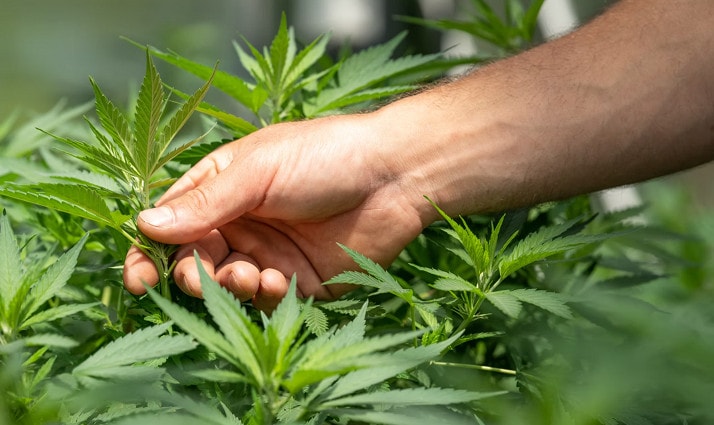
By Moe Asnani
Deja Vu
When the British gained control of India through colonization, they quickly came to the realization they netted one of the wealthiest and most populous markets in the world. By taking power over cotton production and shipping the raw material to England to produce clothing, they were able to sell Indians their own cotton. The Brits then eliminated Indian competition by banning the commercial production of cotton-based clothing in India. In addition, the Crown wrestled control of India’s salt production to maintain foreign control of most facets of Indian life. When Mahatma Gandhi fought for Indian independence, part of his strategy was to break up this colonial monopoly and unite India by boycotting foreign textiles and harvesting salt himself.
Ironically, we in the United States could learn this stark lesson in economic independence and competition. Our broken system allows foreign companies to file cannabis related patents if it is legal in their home country, while preventing American companies from protecting our own intellectual property or our trade names. This is patently bad business, bad policy and bad for Americans. We allow foreign cannabis companies to list on the major American stock exchanges while preventing American cannabis companies from accessing American capital markets.
We promote social equity programs where minority communities can own cannabis businesses. However, when a global pandemic hits, we deny those same American small businesses access to pandemic relief programs while several foreign companies with a U.S. presence can access those funds. Many low-income owners who took personal financial risk were subjected to financial ruin in states like Massachusetts where cannabis was temporarily declared non-essential.
If our current system isn’t creating foreign winners and domestic losers, then what is it doing?
The cannabis community should take a moment to zoom out and have a look in the mirror and our place in the American economic hierarchy.
Perspective
In the past decade, we have seen new economic drivers in the United States—cannabis and cryptocurrency being high up on the list. The data provide a stark contrast. In recent years, American cannabis created over 320,000 jobs with annual legal sales between $18-$25 billion. These numbers increase dramatically as states are rapidly legalizing cannabis.
By comparison, cryptocurrencies are worth over $2 trillion and employ a negligible number of people with very little in terms of tax revenue. However, has Congress studied what effect cryptocurrencies have on workforce capacity, income inequality, productivity and hyperinflation?
Several of my colleagues in cannabis buy into the narrative that our revenues should be targeted as a federal tax goldmine after a decade of being subjected to unsafe banking and cash practices, draconian tax treatment, legislative roadblocks and being treated as second class citizens. Whatever some might think of our industry, it is tangible—but we pay thousands monthly just to have a bank account. We are taxed more than any other business but are unable to take basic deductions like a normal business.
Where do Americans think all that money goes, if not into taxes or overhead and compliance? It is preposterous that an industry which creates new jobs in retail, agriculture, food manufacturing, biotech, sustainable energy, construction, technology and packaging should be treated as an inferior to industries that charge Americans ten times what Brits pay for lifesaving drugs, industries that spill oil into our oceans or a social media company that incites Americans against each other for profit.
Annual legal U.S. cannabis sales is $25 billion at best in 2021. That is how much Elon Musk’s net worth went up on October 25, 2021. I am not here to bash Mr. Musk. I am here to point out that Congress is spending half a decade on how to over-regulate and over-tax an industry that makes in one year what one man gained in one day.
Balanced and Thoughtful Action
First, we must stop the infighting between the activist and corporate cannabis communities. Established predacious industries sharing market space will simply wait for larger groups to get eaten by funding infighting within our ecosystem. Capital can afford to be patient, but we are in volatile times as we approach the 2022 mid-term election. Secondly, there is no way any state-regulated cannabis businesses survive duplicative regulation by the FDA. Medical THC pharmaceutical products available by prescription in all 50 states and food safety compliance should be the only aspects of cannabis regulated by the FDA. The dollar amounts associated with duplicative regulation are astronomical and will hurt many small businesses. Medical marijuana products that comply with state labeling and safety laws should be eligible for Flexible Spending Account reimbursement.
Cannabis legalization should quickly re-assess and provide a fixed amount of carbon tax credits to every cannabis company that does the following:
- Adopt water reclamation programs
- Install low-energy sustainable lighting solutions
- Meet carbon-neutral standards
- Transition packaging to certified biodegradable
Incentivizing cannabis companies to adopt sustainable practices is a win-win for the following reasons:
- Cannabis infrastructure in many states is nascent and tax credits motivate operators to incorporate sustainable practices into their buildout plans
- Congress could use lessons from this program to design sustainable programs with the goal of maintaining stable planetary continuity
- Sustainable practices could be tested by providing USDA tax credits to state-licensed cannabis programs and emulated in other American crop production
The moment is here. We must focus on federal legalization now. We cannot risk going into November 2022 without descheduling, access to banking and capital, the ability to re-file tax returns with no “trafficking” allocations and a pathway for small and large cannabis businesses to access the entire United States cannabis market. States have made good laws. States like Arizona have proven that minority and veteran-owned businesses can succeed and thrive.
Medium and small cannabis businesses are still considered high risk by major banks, lending institutions, sovereign wealth funds, federally licensed private equity groups, hedge funds, pension funds and payment providers. Current laws compel negative treatment by financial companies and the IRS.
This disparate and inequitable financial and taxation system can only be fixed by federal descheduling, not by piecemeal banking legislation.
The Global Alliance for Cannabis Commerce (GACC)
The Global Alliance for Cannabis Commerce (GACC) is a 501(c)(6) trade organization that exists to provide policymakers and legislators with the guidance necessary to take the nascent cannabis industry from the grey market into a global provider of medical and adult-use cannabis products. GACC advocates in front of government policymakers and legislators in order to legalize and regulate the cultivation, manufacture, distribution, or use of medical and adult-use cannabis products globally.
Mohit “Moe” Asnani immigrated to the United States in 1995, graduated from the University of Arizona’s Eller College of Management, worked in clinical and healthcare informatics and partnered with a U.S. Army veteran, Charles “Chip” Boyden, to build a 200+ employee cannabis company (iLAVA) in 8 years by reinvesting in the business, taking no significant debt or dilution and focusing on employee upward mobility. Moe is a director on the boards of GACC (Global Alliance for Cannabis Commerce) and USCC (United States Cannabis Council). He is a former board member of the Arizona Dispensaries Association (ADA).
 AZ Marijuana Arizona Marijuana Info
AZ Marijuana Arizona Marijuana Info






